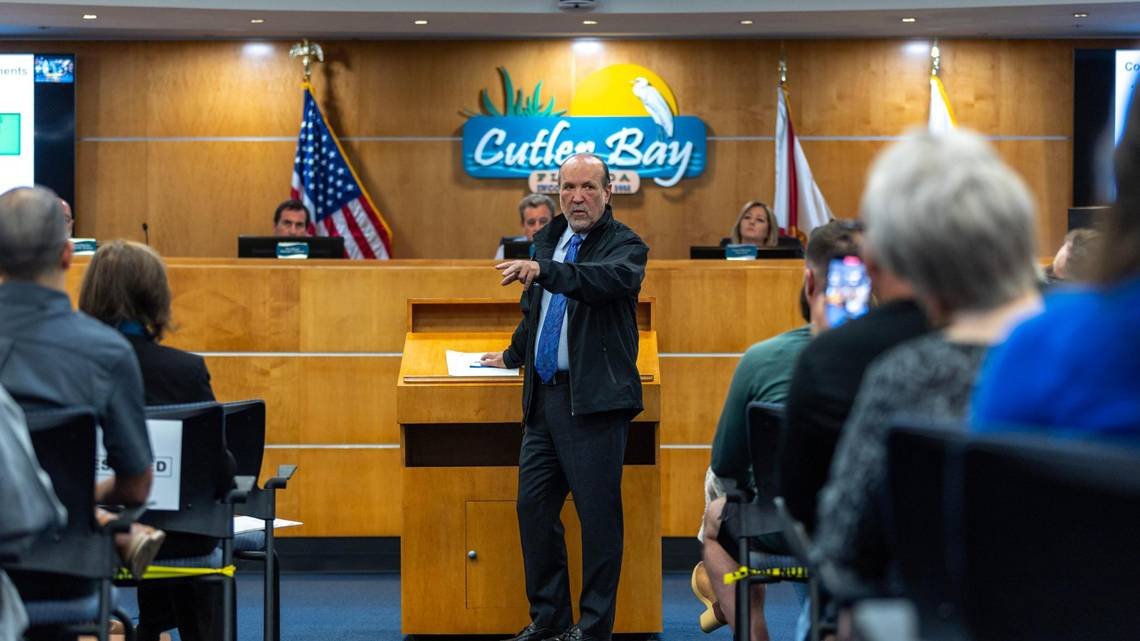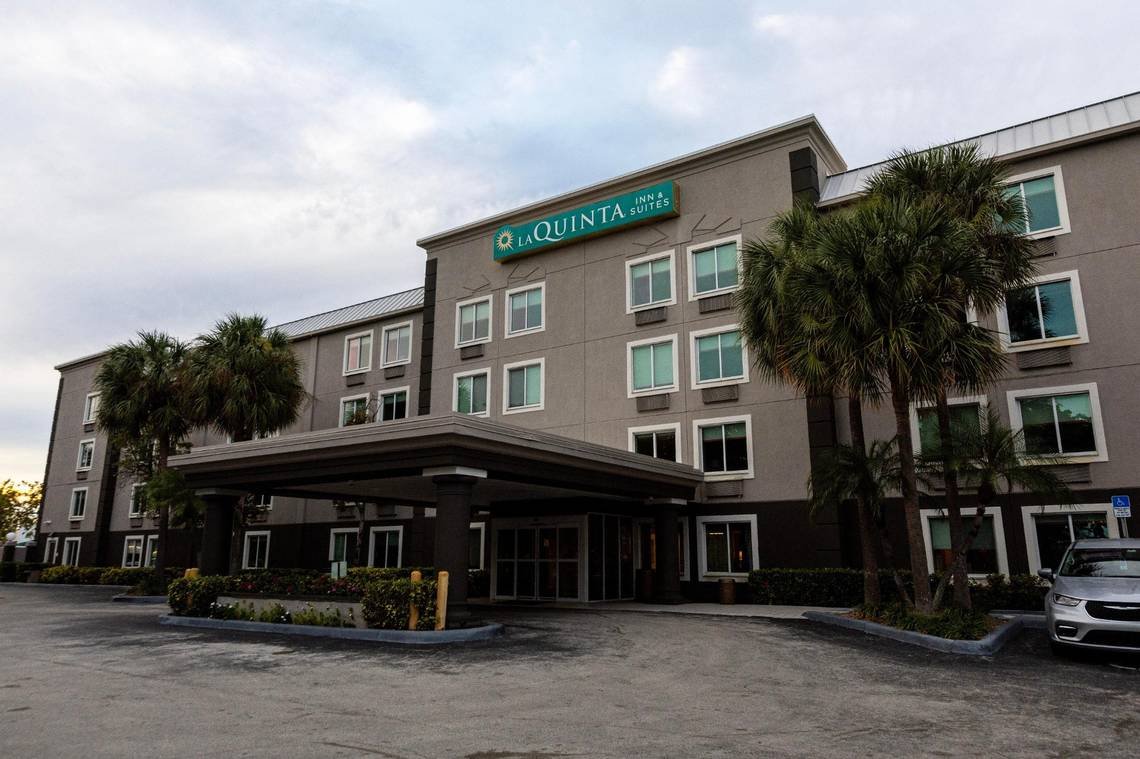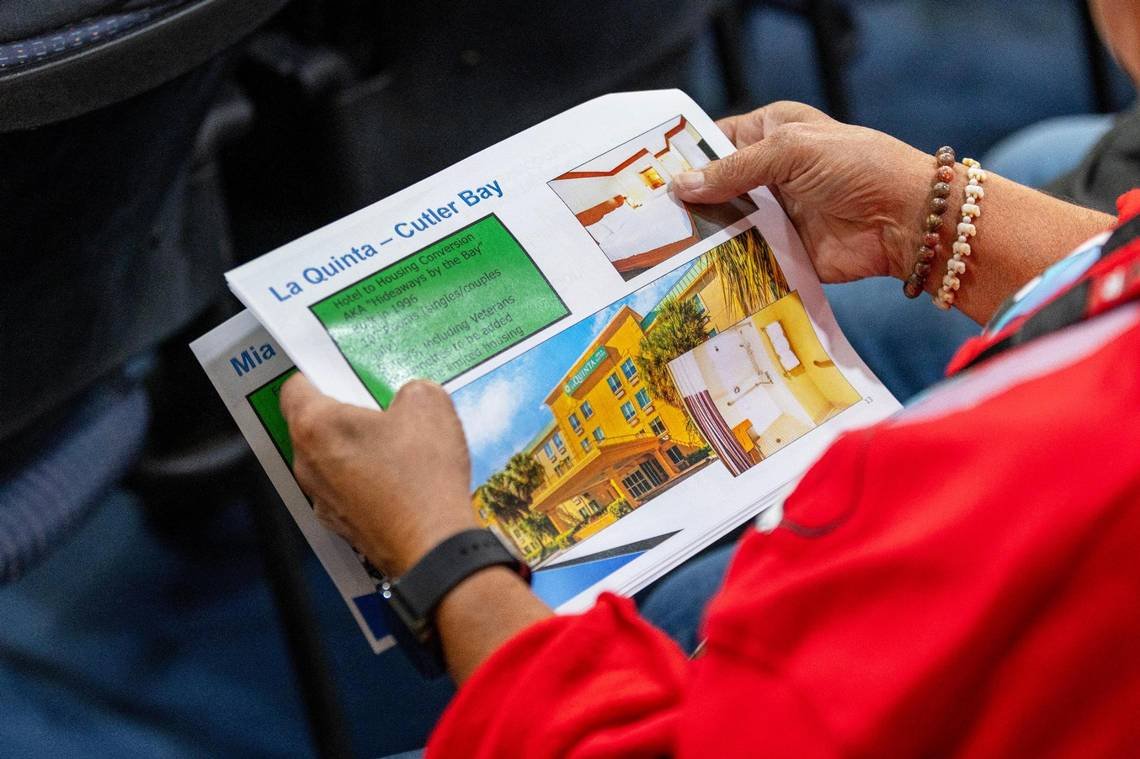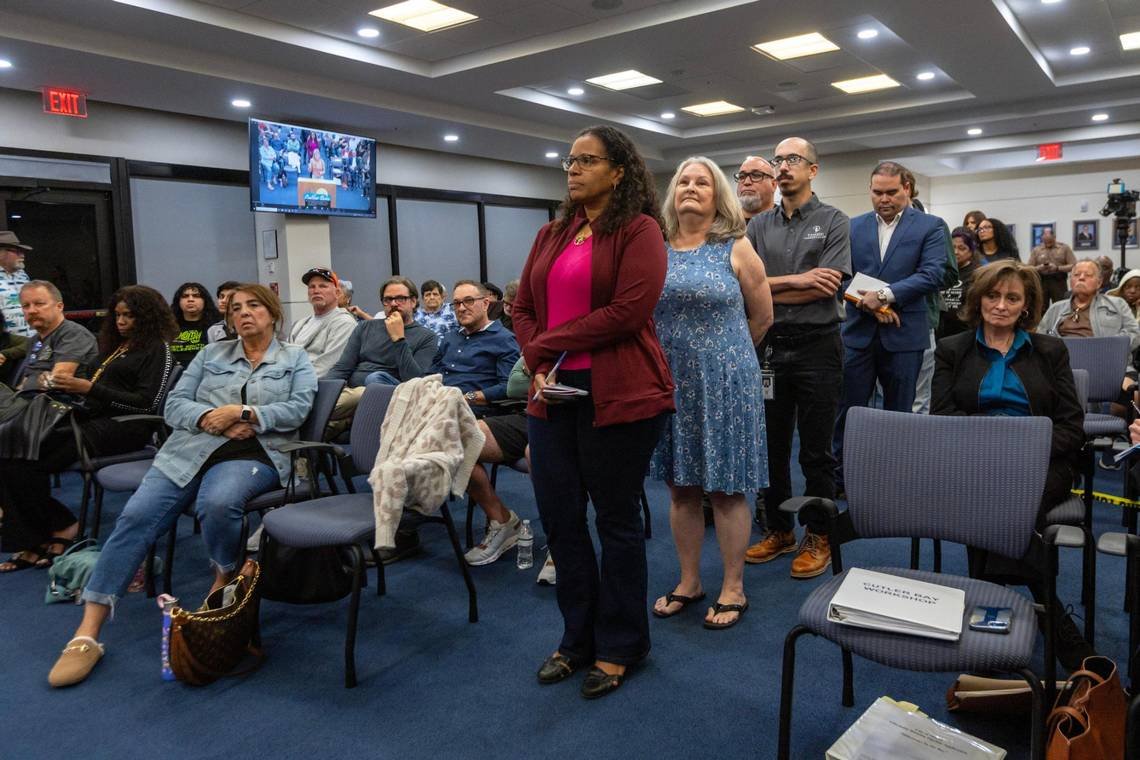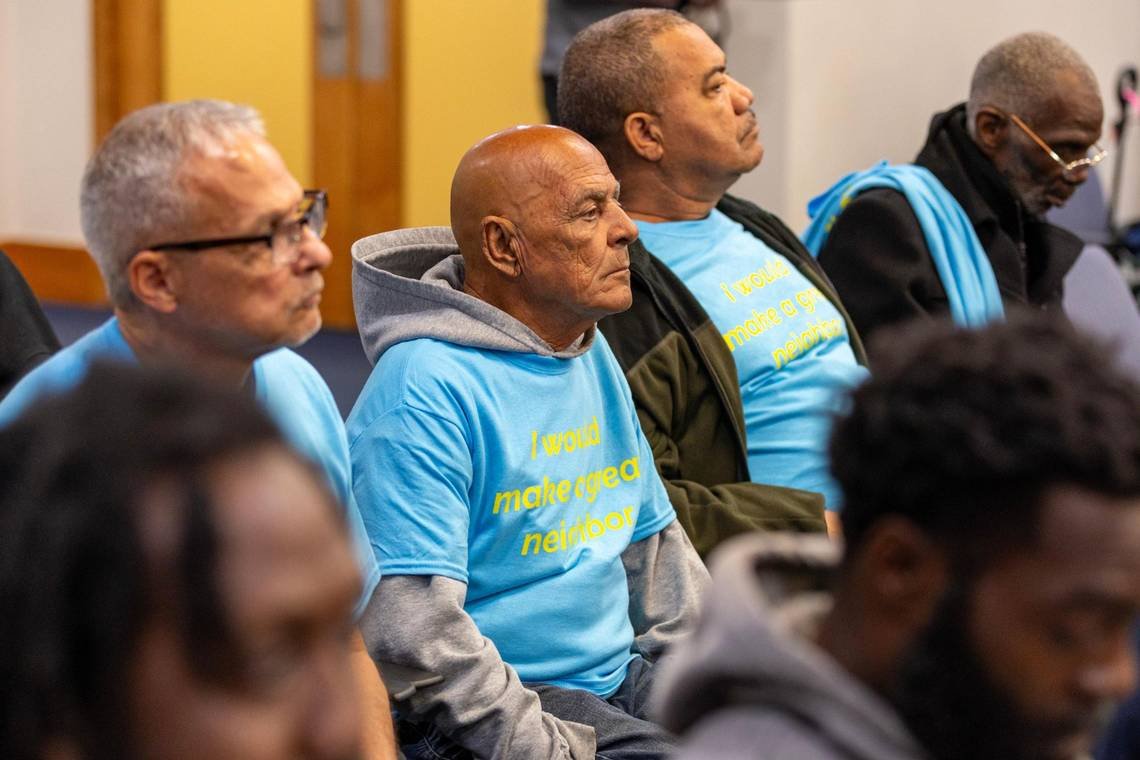Cutler Bay backlash could scuttle plan for low-cost apartments
By Andres Viglucci Miami Herald
UPDATE: The Miami-Dade Commission on Dec. 12 approved a measure sponsored by Commissioner Danielle Cohen Higgins that requires the administration of Mayor Daniella Levine Cava to explore alternatives to a planned purchase by the Miami-Dade Homeless Trust of a Cutler Bay motel for conversion to apartments for formerly homeless people. The resolution, approved by voice vote, requires a report on the search within 60 days.
Earlier this year, housing advocates and the public agency charged with stemming homelessness in Miami-Dade County hailed a major cash infusion designed to put a big dent in the enduring problem.
The $41 million in funding, from the county and the cities of Miami and Miami Beach, was designated for a novel initiative by the Miami-Dade County Homeless Trust. The plan: to quickly buy and renovate buildings across the county to provide long-term, affordable rental apartments for hundreds of people ready to leave shelters and live independently, with a particular focus on seniors.
But one of the trust’s first announced purchases, of a motel in a busy commercial corridor in the South Miami-Dade bedroom suburb of Cutler Bay, has run into a buzzsaw of angry, not-in-my-backyard opposition from some residents and calls for its suspension from town officials. As the campaign gains political traction, leaders of the homeless agency warn it could imperil the future of the nascent program.
The backlash has had consequences. Miami-Dade Commissioner Danielle Cohen Higgins, who voted in support of the new housing program, is now pushing for the county and the Trust to reconsider the planned Cutler Bay acquisition.
She persuaded colleagues to strike an earmark for the Trust’s Cutler Bay purchase from the county budget in September, and is sponsoring a resolution, to be heard Dec. 12, that would order county administrators to take up to 60 days to search for alternative sites in her District 8 — a delay that Trust officials say could scuttle their purchase contract. A commission committee gave the green light for the vote on Cohen Higgins’ resolution in November.
The Trust, a county agency with its own semi-autonomous board of directors, signed a $14 million agreement in late September to purchase the 107-room La Quinta Inn on Caribbean Boulevard for conversion into studio apartments after months of planning, negotiations with the property owner and extensive consultation with county and town officials, including Cohen Higgins.
It would be the third Trust acquisition made possible this year by the multi-million-dollar funding package. The first, the 118-unit Mia Casa residence for seniors in North Miami, opened early this year to effusive praise from that city’s mayor. A second project, on Krome Avenue in unincorporated far west Miami-Dade, is in the planning stages and would convert an unused juvenile residential facility into 190 apartments for single men.
The push is one of several initiatives by the county to address an affordable housing crisis that is making rents increasingly unaffordable for a significant slice of Miami-Dade residents. Experts now say that the shortage of affordable housing across the country is the major cause of homelessness.
‘THE MOST PERFECT LOCATION’
The location in Cutler Bay, Trust officials say, is in many ways ideal. The motel sits sandwiched between a McDonald’s, gas stations and a Motel 6 in a commercial zone separated from residential neighborhoods by the Florida Turnpike and U.S. 1. It’s adjacent to the south Miami-Dade busway for public transit, within walking distance to a Publix and directly across the street from shops, services and jobs in the Southland Mall.
The conversion requires no zoning changes, Miami-Dade and Trust officials say, because it sits inside a county-controlled rapid-transit zone that already allows it.
If opponents succeed in blocking the Cutler bay purchase, Trust officials say, they fear others will use the precedent to scuttle future acquisitions in other areas on the basis of neighborhood or political opposition. An important goal of the program, they say, is to spread the apartments around the county to help formerly homeless people live in their own neighborhoods. The Trust looked at a long list of properties in the area before settling on the Cutler Bay motel as the best available option by far, they said.
“This is the most perfect location we could have possibly found,” Ron Book, the influential and sometimes-controversial lawyer and lobbyist who has led the Trust as chairman since 2006, said in an interview. “This is the first time in 32 years that someone has attempted politically to stop what we’re doing. This is NIMBYism at its best. There is no legitimate objection to this use of the property.”
A woman holds a packet explaining the Miami-Dade County Homeless Trust’s plan to convert a La Quinta Inn motel in Cutler Bay into affordable apartments for the formerly homeless during a town council forum on Nov. 29, 2023. D.A. Varela dvarela@miamiherald.com
Book and Trust executive director Victoria Mallette have stressed the building would be indistinguishable in appearance or function from any other residential rental property, and they complain that critics persist in misleadingly referring to it as a homeless shelter. Tenants would be screened for suitability, sign leases, pay rent and must follow routine building rules. In addition, an in-house case manager would connect residents with any needed services.
They also note the Trust already has placed some 5,000 formerly homeless people in apartments for years across the county under agreements with private landlords with no significant issues. But by owning the apartments, the Trust will control rents and maintenance, and will ensure they remain available and affordable in perpetuity.
The initiative, Book and Mallette say, is critical to a county effort to sharply reduce the number of people living on the streets, which the most recent annual count put at 980. Shelters across Miami-Dade, with a total of 2,400 beds, are full to the brim and people living in them often have to wait months or years for suitable housing. Moving shelter residents out will open beds to new occupants, helping reduce the unsheltered population by hundreds, they say.
‘INCOMPATIBLE’ WITH UPSALE PROJECT PLANS
Opponents in Cutler Bay so far have raised few concrete objections to the Trust plan or the location. Town officials and some residents say the motel conversion would be “incompatible” with announced plans for a massive, dense and upscale redevelopment that would replace the failing Southland Mall with up to 4,400 apartments, a hotel, shops and offices. The proposed redevelopment, which has yet to get underway despite an announced groundbreaking of mid-2023, would not include affordable housing.
A broader “town center district” upzoning approved by the town to encourage denser development in a tightly circumscribed area, including the Southland Mall project, also includes the two-acre motel property, though no plan for the lot has surfaced beyond the Trust acquisition.
People line up to speak during a Cutler Bay town council forum on a plan by the Miami-Dade County Homeless Trust to convert a La Quinta Inn motel into affordable apartments for the formerly homeless. D.A. Varela dvarela@miamiherald.com
“Is that the highest and best use for that property?” Town Manager Rafael Casals said in an interview. “Our position is that it’s not.”
Casals, however, said he does not know of a suitable alternative in Cutler Bay.
After Book presented the plan in a public forum for the first time at a Nov. 29 town council workshop and fielded dozens of questions from elected officials and residents, Mayor Tim Meerbott, who has been leading the charge against the Trust motel purchase, said his mind is made up.
“I would like to find another site for this, without a doubt,” Meerbott said.
The campaign against the Trust plan has at times taken a nasty turn. Several posts on a public Facebook page dedicated to stopping the purchase claim the conversion could bring child molesters and drug dealers to town or, as one resident put it on a video he published on the page, “endanger the lives” of the town’s 45,000 residents.
During the council workshop, at which Book was interrupted by occasional catcalls from the audience, one Cutler Bay man raised the concern that building tenants would turn to stripping at a nearby club.
Book, who vows that neither sex offenders nor violent ex-felons would be allowed in the apartments, retorted: “I doubt my senior citizens are going to be doing pole dances anytime soon.”
Moreover, he said, the Trust would be cleaning up a property that police records show is now a public nuisance, with a high number of complaints running from sexual battery to robbery and assault.
The furious response to the Trust plan appears to represent in part the latest public pushback against far-reaching efforts by local and state officials to foster development of badly needed housing, especially affordable housing, by overriding local zoning controls that advocates say are often too restrictive. The trust and the county have cited state and Miami-Dade development regulations that allow the motel conversion to go forward without formal legal review or approval by Cutler Bay apart from basic building permits.
IN THE WORKS FOR TWO YEARS
Opposition to the purchase has also been fueled by public statements by Cutler Bay officials, including Mayor Meerbott, suggesting that the motel plan was sprung on the town by the Trust without officials’ input or consultation.
But according to a detailed chronology of the plan’s development released by the Trust, discussions about the potential purchase began more than two years ago, in mid-2021, and have at various times involved numerous public officials, including Cohen Higgins and Cutler Bay administrators.
Cutler Bay Mayor Tim Meerbott speaks during a Nov. 29, 2023, town council meeting about the Miami-Dade County Homeless Trust’s plan to convert a La Quinta Inn motel into affordable apartments for the formerly homeless. D.A. Varela dvarela@miamiherald.com
The memo says Cohen Higgins was first briefed in early 2022, and was subsequently kept abreast of negotiations. “Cohen Higgins expressed continued support,” the memo reads in a note on a February 2023 meeting where the commissioner asked Trust administrators to inform Cutler Bay of their intentions. The office of Miami-Dade mayor Daniella Levine Cava was also informed along with county purchasing officials, the memo says.
Cohen Higgins confirmed that the briefings took place, but denied she ever indicated support for the La Quinta Inn location. While she concedes the Trust did consult with town leaders, she faulted the agency for not seeking input from residents until November.
“I don’t agree with the chronology. It’s incredibly one-sided. It reflects nothing of our conversations,” she said in an interview. “I said, ‘Get the community involved.’ And that wasn’t done.”
Cohen Higgins also took issue with the purchase price, which is some $4 million higher than two appraisals undertaken by consultants for the county — a gap she called “curious.”
Book said the Trust would not have gone forward with purchase negotiations without Cohen Higgins’ assent. And he and Mallette said the county is now undertaking a third appraisal because its expert believes the first two were flawed, failing to take into account the value added to the property by the county’s dense rapid-transit zoning.
“The chronology is not only accurate, it is reflective in very clear terms of what did indeed take place,” Book said.
Cohen Higgins questioned the decision to undertake a third appraisal as “convenient.”
The Trust chronology also seems to undermine public suggestions by town officials that they were not consulted until the purchase deal was almost done.
Miami-Dade County Homeless Trust Chairman Ron Book, right, speaks with Cutler Bay Town Manager Rafael G. Casals during a Nov. 29, 2023, town council workshop about the agency’s plan to convert a La Quinta Inn motel into affordable apartments for the formerly homeless. D.A. Varela dvarela@miamiherald.com
According to the document, Cutler Bay town administrators, including manager Rafael Casals and the municipality’s community development director, were notified of the potential deal in March of 2023 and participated in several subsequent discussions and meetings, including a tour conducted by Trust and county officials of the property on Sept. 17 — 12 days before the purchase contract was signed. Trust officials say the town representatives raised no objections to the purchase.
On Sept. 23, however, the town released a video statement by Meerbott in which he said: “They (the Trust) did that without any input from me or the rest of the council, or from any of our citizens as well...I felt that wasn’t the right thing to do without our input.”
The assertion may be strictly true, since the Trust document doesn’t indicate Meerbott or council members were part of the discussions. But Casals reports directly to and is known to work closely with the mayor and council.
Elizabeth Soto, a Cutler Bay resident who started the Facebook group opposing the Trust purchase, said she understood from Meerbot’s statements that the town had not been consulted at all. But even if it had, she said in an interview, she still doesn’t think it’s the right place for the affordable apartments, calling the Trust deal “a little fishy.”
“I’m not okay with it. It doesn’t make sense,” she said, before referring to redevelopment plans. ”The town is trying to make this a vibrant place.”
Supporters of a plan by the Miami-Dade County Homeless Trust to convert a motel in Cutler Bay into affordable apartments for the formerly homeless listen to a town council forum on the proposal while wearing t-shirts that read: “I would make a great neighbor.” D.A. Varela dvarela@miamiherald.com
Casals, in an interview, confirmed that the conversations and the tour listed in the Trust memo did in fact occur. The one issue the town raised, he said, was that the motel room sizes are below the minimum residential requirement of 600 square feet under its code. The Trust says it started an application for a variance, but county zoning officials said they didn’t need to.
County regulators cited two zoning laws that supersede Cutler Bay rules, including Miami-Dade’s rapid-transit zoning districts. These are special zones around transit stations or corridors in which the county -- not local municipalities -- control development rules with the goal of encouraging dense new clusters of apartments and businesses linked to public transportation.
They also cited the state’s new Live Local Act. Approved by the Legislature earlier this year, the act pre-empts local zoning rules to encourage development of affordable housing, allowing greater density and height in exchange for providing “workforce” apartments renting at substantially less than market rates.
The state act has proven controversial. Cities like Doral, Hollywood and Miami Beach have pushed back against developers proposing towers far taller than anything around under Live Local, including one proposal to redevelop the historic Art Deco Clevelander Hotel on Ocean Drive in South Beach. In both Doral and the Beach, developers significantly downsized plans in the face of strong opposition from neighbors and elected officials.
In the case of La Quinta, however, the building would remain as is, with no additions. Kitchenettes would be added to the motel rooms to convert them into micro-unit studio apartments.
But opponents like Soto say Cutler Bay should have a say in the matter, echoing some critics of pre-emption laws.
“I don’t think that’s correct to just bypass the local government,” she said. “Why then have the local government?”
QUESTIONS FROM COUNTY
Trust officials aren’t the only ones to question the motivations behind the push to stop the Cutler Bay purchase.
Miami-Dade County Homeless Trust Chairman Ron Book speaks to the Cutler Bay town council about his agency’s plan to convert a La Quinta Inn motel into affordable apartments for the formerly homeless on Nov. 29, 2023. D.A. Varela dvarela@miamiherald.com
At a November 13 Miami-Dade committee hearing where Cohen Higgins won referral to the full commission of her resolution to seek alternatives to the La Quinta Inn purchase, Commissioner Keon Hardemon said he found the request “troubling.” “The homeless trust has announced their intention. We’ve agreed with their intention,” Hardemon said, adding: “I don’t see a reason to delay.
The Homeless Trust is putting forth an effort that many people misunderstand and that they fear. Some of the worst atrocities happen in our communities when people misunderstand you and they fear you. I fear that it’s going to cause a harm that I’m not going to accept.”
Commissioner Raquel Regalado echoed Hardemon.
“The tenor of this, the timing of this, concerns me,” she said. “What happens if this contract falls through while we’re looking for other alternatives? Is this going to run the clock so that there is nothing available for the Homeless Trust in this district. And what happens then?”
Book said the sale contract calls for a purchase closing 45 days into 2024, but that the sellers can back out at any time. He noted the Trust has already spent $300,000 on appraisals, required environmental studies and other analyses of the La Quinta Inn property.
He also said he will be glad too look at alternatives sites, but the Trust’s search suggests there isn’t one.
“It would be a terribly community message to throw all this in the garbage,” Book said. “This would throw a monkey wrench into this effort. We cant let a handful of NIMBys destroy the solution to homlessness. Somebody’s got to speak up for these folks.”

